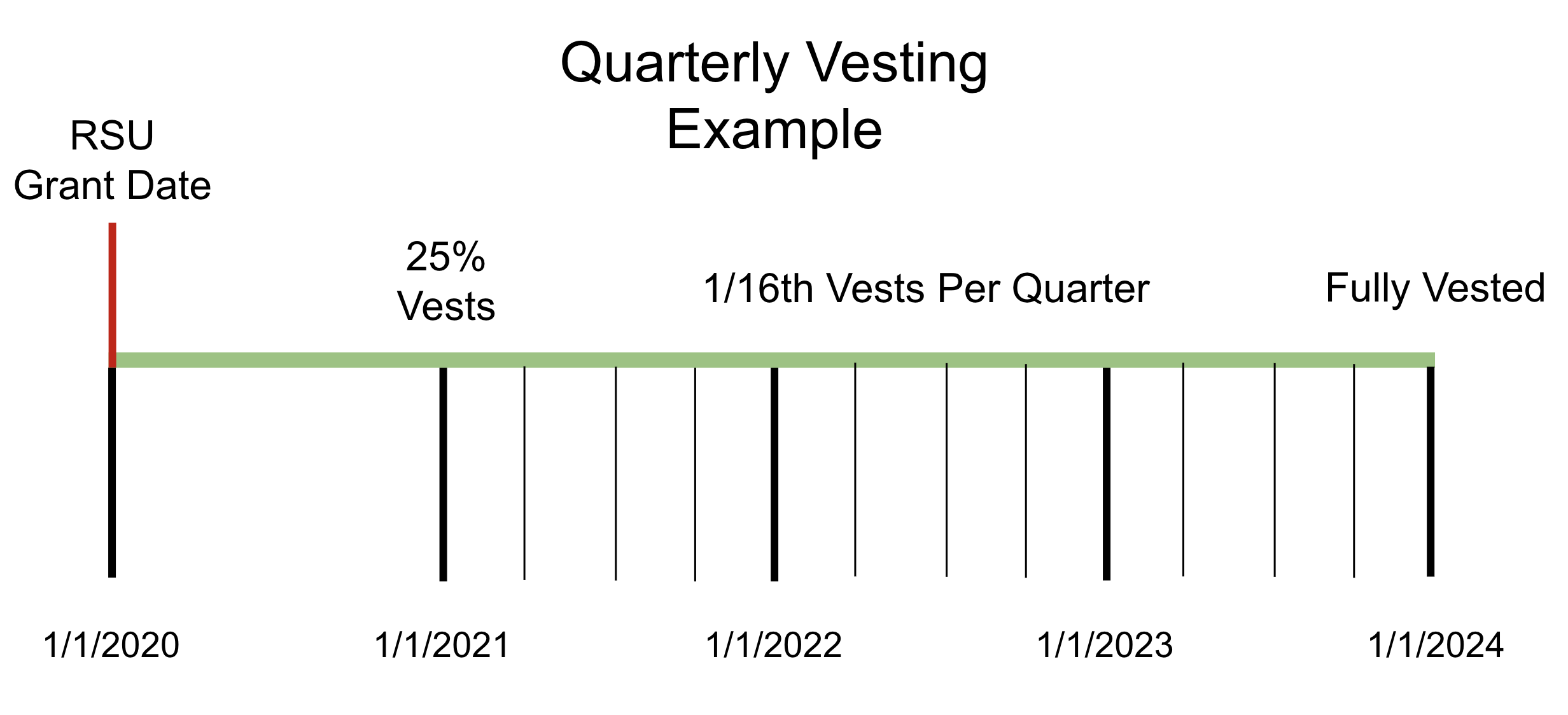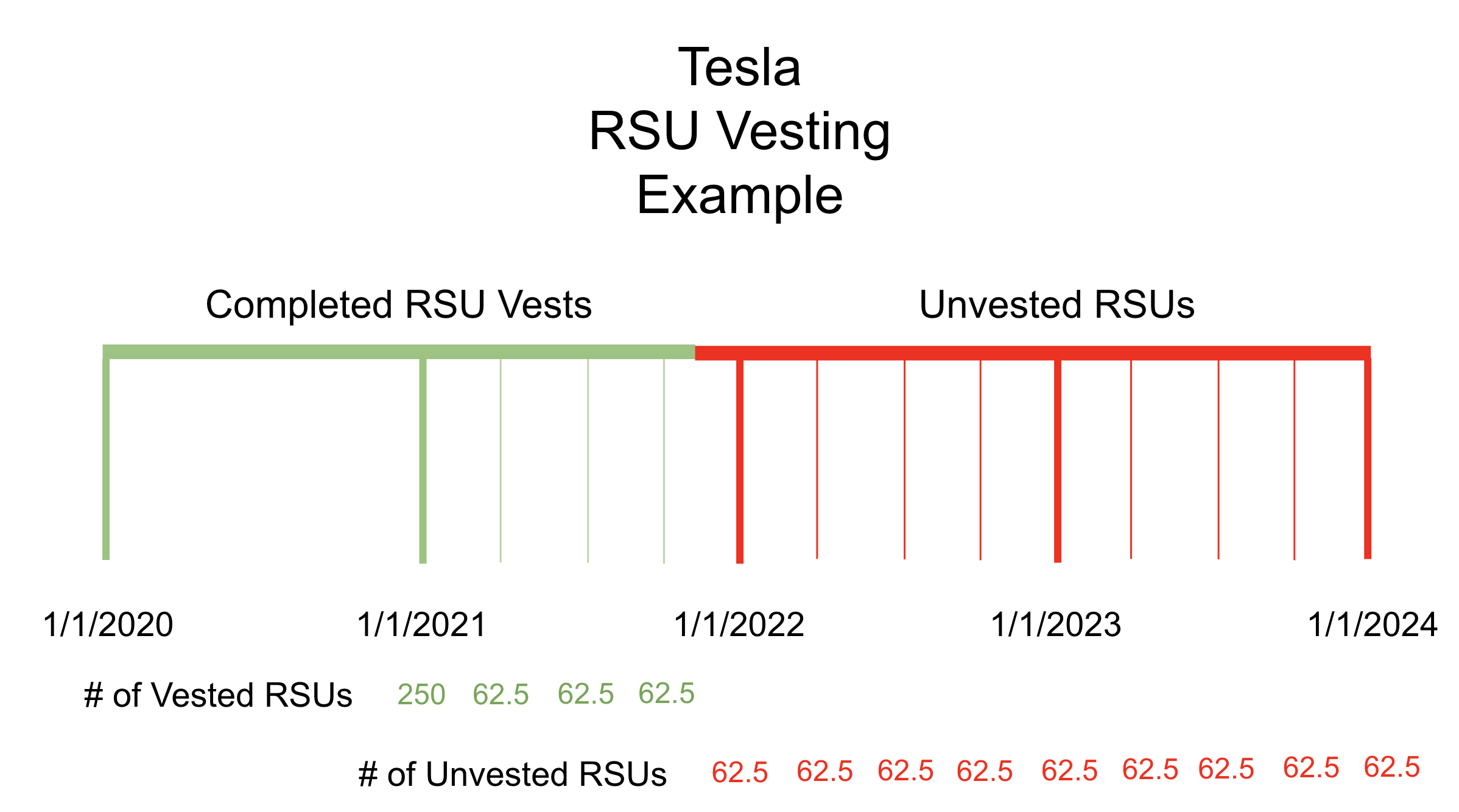What Happens to RSUs When You Quit?
Restricted Stock Units (RSUs) are now the most popular form of equity compensation. And they’ve become a common tool companies use to help retain and attract talent.
If you work in tech, it’s not uncommon to change jobs every couple of years. Quitting and finding a new place to work can lead to a higher salary, but begs the question, “What happens to my RSUs when I quit?”
The purpose of this article is to explain (1) what happens to your RSUs when you quit and (2) how you can plan to make a transition to another company smoothly.
Understanding Vested & Unvested RSUs
A grant of RSUs is, in essence, a promise your employer makes that they’re willing to give you X number of shares provided you stick around for a certain period of time.
Once you’ve been at the company for that period of time, your employer releases company shares to you and they officially become yours.
In other words,
Vested RSUs are company shares that you now own outright.
Unvested RSUs are company shares that you’ve been promised, but that haven’t yet met the company’s time condition.
Quitting with Vested RSUs
Whenever you decide to quit, the vested portion of your RSUs will stay yours.
Since shares of company stock are released to you upon a vesting date, those RSUs become shares that you own outright. And since you now own company shares outright, your departure from the company has no effect on your ownership.
Quitting with Unvested RSUs
Quitting with Unvested RSUs means you lose the right to receive company shares.
Remember, your company promises to release the RSUs only if you stick around for a certain period of time. So if you don’t stick around for that length of time, it’s only fair that you forfeit your right to those shares.
Since vesting schedules vary from company to company, it’s important to know exactly when you have upcoming vests of RSUs. The last thing you want to do is quit right before receiving shares from a piece of your RSU grant that vested - we’ll discuss this more in a second.
Example of Quitting with Vested & Unvested RSUs
Here’s an example of what happens to your RSUs when you quit:
Let’s say that you work for Tesla and received a grant of 1,000 RSUs on 1/1/2020.
At the time of grant, Tesla was trading at $86.05, which means that immediately upon grant, the value of the unvested portion of that grant was $86,050.
The grant agreement states that the RSUs will vest over 4 years, 25% each year. However, after the first year, each of the remaining 25% annual chunks vest quarterly. Here’s what that would look like from the date of grant through the end of the vesting schedule:
Now let’s fast forward to 12/21/2021 (almost a full two years later). It’s the holiday season, you’re feeling overworked and want to quit immediately.
When you began working for Tesla, shares were worth $86.05 a share. But now, as of 12/21/21 Tesla shares are worth roughly $650 a share.
As your RSUs have vested over the last two years, you’ve benefited from the increase in share price.
So what happens if you decide you’ve simply had enough and quit immediately? Let’s see what happens to those unvested shares and how much value you’d be giving up by quitting before they vest:
As you can see from this example, there are 62.5 RSUs that are scheduled to vest on 1/1/2022.
Assuming the price on 12/21/21, those 62.5 RSUs would be worth $40,625.
If you quit on 12/21/21, all of that value would have been forfeited. That $40,625 would make it worth putting up with the added holiday stress to stick around for another couple weeks.
Monitoring Your RSU Vesting Schedule Before Quitting
Anytime you’re considering leaving your current job to pursue another, you’ll want to make sure you understand exactly when you have upcoming vests of RSUs (so you can avoid the situation in our last example).
When receiving grants of RSUs, it’s not uncommon to receive them annually and at different times of the year. With various grants vesting at different times, tracking when they will vest can be a little tricky.
Fortunately, if you’ve received a grant of RSUs at a public company, you can log into the brokerage account that your employer has set up for you. The brokerage company itself will vary by employer, but it’s likely that your employer uses Charles Schwab, Fidelity, Carta, Shareworks, or Etrade to help manage company employee equity.
To check upcoming vests of RSUs, you’ll want to log into the brokerage’s website and look for upcoming transactions.
Once you’ve found that section, you’ll be able to get a better picture of exactly which grants of RSUs have upcoming vests. Before putting in your two weeks notice, you’ll want to check your upcoming transactions because it may affect the timing of your decision to quit.
Calculating the Value of Lost RSUs
Once you’ve found the section that shows upcoming RSU vests, you’ll be able to calculate the dollar value you’d lose by quitting. But there are actually three values that you’ll want to consider as you get ready to make the decision to hunt for another job or quit your current job.
#1 - All Unvested RSUs
Calculating the value of all unvested RSUs is very straightforward. It’s:
# of unvested RSUs x the current market price
Having this number handy is helpful for negotiations, and it gives you a great sense of the long-term value you might be leaving on the table. That said, it doesn’t give you the full picture.
#2 - RSUs Vesting Within the Next Year
The next value you’ll want to calculate before quitting and leaving additional RSUs on the table is the total value of RSUs that are set to vest over the next year.
Not all brokerages will make this super easy, so you may need to manually add up the expected vests of RSUs.
The reason you’ll want to review this value is because (1) you will want to get a better sense of the near-term and (2) you want to be able to compare the next year’s value of unvested RSUs to the remaining three to four years of unvested RSUs.
Everyone’s situation is different, but it’s not uncommon to have a much larger value of RSUs over the next year, than the next three years. This can happen for a variety of reasons, but if you’re in a situation in which your next year’s worth of unvested RSUs is worth much more than the remaining years, it may incentivize you to stick around just long enough to get the bulk of your value out.
#3 - The Value of Recurring RSU Grants
The last value that you’ll want to know before you quit is the value of each recurring grant at the time of grant.
As you go through review cycles and get raises or promotions, you’ll eventually start to receive “refresher” grants of RSUs. You’ll want to remember the value of each refresher grant because it’s another part of your compensation and will be helpful when you begin negotiating for another position someplace else.
Your Current RSUs Will Help During Negotiations
Before they quit, most people will have another job lined up or will at least have a standing offer. Of course, this isn’t a requirement, but in today’s environment it’s a smart move. Being employed (or having a solid offer) automatically puts you in a stronger position than if you’re in search of a job.
Assuming you’re still employed while looking for another place to work, you’ll be able to leverage the RSUs you’ve received into a compelling offer from another employer.
Your prospective new employer understands that you don’t want to lose a bunch of unvested RSUs by changing employers. To compensate, most hiring managers are willing to offer competitive introductory grants of RSUs to persuade you to jump ship.
In fact, even if the role you’re applying for doesn’t typically receive RSUs, it’s not uncommon to receive RSUs as part of the initial offer.
We’ve written two popular articles on how to negotiate your equity, so if you haven’t read them, please give them a read. How to Politely Ask for RSUs at a Public Company and 5 Tips for Negotiating RSUs.
Quitting With RSUs - Final Thoughts
At the end of the day, all of us want to feel that our work is fulfilling, that we are adequately compensated for that work, and that we enjoy a sound work-life balance. Gone are the days of working for one company for decades in order to achieve these goals.
Especially in the tech industry, changing jobs every 2-4 years is a common strategy to move up the career ladder and enjoy improved compensation and lifestyle. This may mean occasionally giving up some unvested RSUs, but it also means you’re likely to replace what you lose with even more valuable RSUs and probably a better salary.
We hope this article has given you a better sense of what happens to your RSUs when you quit and that we’ve provided some useful ideas for how to transition to a new company a bit more wisely and smoothly.




